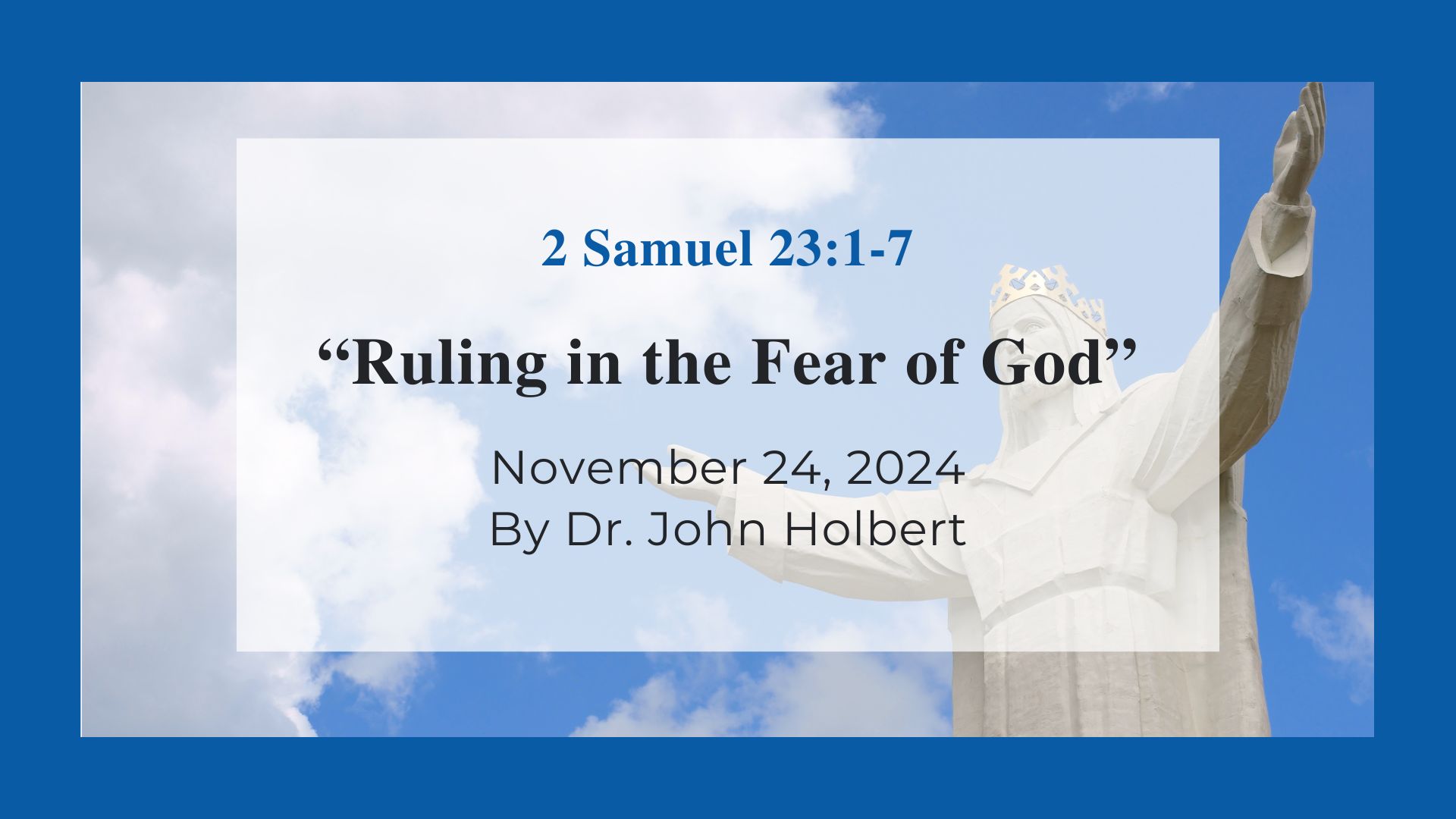Ruling in the Fear of God - Reflections on 2 Samuel 23:1-7, Reign of Christ Year B
by John Holbert on Monday, November 18, 2024

Reign of Christ. Proper 29. November 24, 2024. 2 Samuel 23:1-7. “Ruling in the Fear of God”
On this final Sunday before the turn of the Christian year, the movement toward Advent, the lectionary gives us a very difficult text. It begins with the finally inaccurate statement: “These are the last words of David” (2 Sam.23:1). Canonically, of course, they are not David’s last words, not even close. He has much more to say as he ages and dies, and unfortunately, much that he has to say is both terrible and monstrous (1 Kings 2). But here, one could say that these words in 2 Samuel 23 could be the last poetic words of the “sweet singer of Israel,” as verse 2 says it. Some have suggested the possibility that David himself could actually have written this small poem; the Hebrew appears quite old, and the language is both terse and opaque. As such, the translation is particularly uncertain in more than a few places; nevertheless, the text might be seen as a kind of summary statement of what a true king is to be described to be, the apparent reason the lectionary collectors chose these words to presage the coming Advent of Jesus of Nazareth.
The poem is set as an oracular speech of the king, thus the formulation: “Thus spoke David, son of Jesse, thus spoke the man raised on high (more literally what the Hebrew text says, over against what NRSV suggests), annointed of the God of Jacob, and sweet singer of Israel” (2 Sam.23:1). The last and most famous line of the speech was given first by KJV, and is as good a guess as any concerning what the Hebrew may mean. Literally, the text seems to say: “sweet one (favorite) of the chants of Israel.”
“YHWH’s spirit has spoken in me,
God’s utterance on my tongue.
The God of Israel has said,
to me the rock of Israel has spoken: (2 Sam.23:2-3)
The poet claims that what is about to be spoken is inspired language, imbued with YHWH’s spirit, empowered by the direct gift of Israel’s very rock. Now follows cryptic, not to say peculiar syntax, that has taxed translators for centuries. I will offer a reading that attempts to make sense of the words, while staying close to the oracular quality of the speech.
“The one who rules humanity, just,
who rules (in) the fear of God.
There is no “in” in the sentence but that appears to be implied. The ruler is said to be primarily concerned with a just rule, focusing kingly attention on that significant word that should define the work of God’s ruler, made clearer in the second line by the designation, “the fear of God,” being in awe of the God that determines the true work of any ruler.
Now follows what seems to be a poetic description of that rule.
“Like morning’s light when the sun comes up,
morning without clouds,
from radiance, from showers—grass from earth” (2 Sam.23:4).
Then we hear of the nature of David’s gift of dynasty from God.
“For is not thus my house with God?
an eternal covenant God gave me,
in full, guaranteed.
All my triumph and all my desire,
will God not bring to blossom?” (2 Sam.23:5)
Then appears the antithesis of one like David.
“The worthless one is like a thorn—
uprooted all,
not to be picked up by hand.
Should anyone touch,
they must get iron
or the shaft of a spear.
In fire they shall be completely burned” (2 Sam.23:6-7).
Any who oppose the legitimate dynasty of David will find themselves raked up like thorns and burned in a fire. And note that the raking tools are in fact weapons, the shaft of a spear, indicating that military means will be chosen as needed to protect the eternal dynasty of this great king David. Of course, in early Christian theology, David plays a central role in the legitimacy of the kingship of Jesus, from whom Jesus is said to be descended as royal heir. The text may be obscure, but its claim is not: David is the great king, and his dynasty is from YHWH, who affirms it for all eternity. And with that brief poem of royal power, we Christians are now ready for Advent: Come, King Jesus and rule in justice and in the fear of God!
